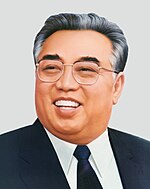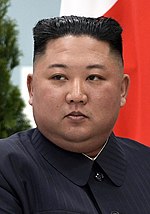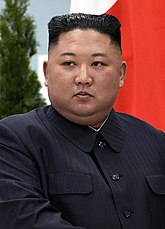President of the State Affairs of North Korea
| President of the State Affairs Commission of the Democratic People's Republic of Korea | |
|---|---|
| 조선민주주의인민공화국 국무위원회 위원장 | |
 Emblem of the President of the State Affairs Commission | |
 Flag of the President of the State Affairs Commission | |
since 30 December 2011 | |
| Style | Respected Comrade (Within the DPRK) His Excellency (International correspondence) |
| Status | Head of state |
| Residence | Forbidden City Ryongsong Residence |
| Seat | Pyongyang |
| Nominator | Central Committee of the Workers' Party of Korea |
| Appointer | Supreme People's Assembly |
| Constituting instrument | Constitution of North Korea |
| Precursor | Chairman of the National Defence Commission |
| Inaugural holder | Kim Jong-un |
| Formation | 29 June 2016 |
| President of the State Affairs of North Korea | |
| Chosŏn'gŭl | 조선민주주의인민공화국 국무위원회 위원장 |
|---|---|
| Hancha | |
| Revised Romanization | Joseon minjujuui inmin gonghwaguk gukmu wiwonhoe wiwonjang |
| McCune–Reischauer | Chosŏn minjujuŭi inmin'gonghwaguk kukmu wiwŏnhoe wiwŏnjang |
 |
|---|
|
|
The President of the State Affairs Commission of the Democratic People's Republic of Korea (Korean: 조선민주주의인민공화국 국무위원회 위원장), previously referred to as the Chairman of the State Affairs Commission, is the head of state of North Korea.[1] The President heads the State Affairs Commission (SAC), which is the highest leadership institution in North Korea, and serves as the commander-in-chief of the North Korean armed forces.
The North Korean constitution gives the President the power to lead the overall affairs of the state and appoint important state officials.[2] The President also has the power to appoint diplomatic representatives and conclude treaties with other countries.[2] The President can declare a state of emergency, a state of war or a mobilization order and direct the country's national defense during times of war.[2]
The President of the State Affairs Commission is elected by the Supreme People's Assembly.[3][4] The position is held by the General Secretary of the Workers’ Party of Korea (WPK), who leads the ruling political party of North Korea and serves as the supreme leader of North Korea. The term of the President is the same as that of the Supreme People's Assembly and has no term limits.[5]
The current President is Kim Jong-un, who took office on 29 June 2016 and was re-elected on 11 April 2019.[6][7]
History
Chairman of the National Defense Commission
The position was first established as the Chairman of the National Defense Commission of the Central People's Committee of the Democratic People's Republic of Korea (Korean: 조선민주주의인민공화국 중앙인민위원회 국방위원회 위원장) on 28 December 1972. At that time, the National Defense Commission was a commission subordinate to the Central People's Committee, which was the highest leadership institution in North Korea from 1972 until 1998.
The 1972 North Korean constitution stated that the President of North Korea is also the Chairman of the National Defense Commission, as well as the supreme commander of the country's armed forces.[8] Kim Il-sung, who was the President of North Korea, was the Chairman of the National Defense Commission from 28 December 1972 until 9 April 1993.
On 9 April 1992, the position became known as the Chairman of the National Defense Commission of the Democratic People's Republic of Korea (Korean: 조선민주주의인민공화국 국방위원회 위원장) following the approval of an amendment to the 1972 constitution that made the National Defense Commission into a separate institution from the Central People's Committee. The amendment expanded the Chairman's powers to become the head of the highest military leadership institution in North Korea.
The 1992 constitutional amendment no longer required the President to also be the Chairman of the National Defense Commission and the supreme commander of the armed forces. This allowed Kim Jong-il, who is Kim Il-sung's designated successor, to be elected as Chairman of the National Defense Commission on 9 April 1993. Prior to his election, Kim Jong-il was elected as first vice Chairman of the National Defense Commission on 24 May 1990 and became the supreme commander of the Korean People's Army on 24 December 1991.
Following Kim Il-sung's death on 8 July 1994, another constitutional amendment was approved on 5 September 1998 which further expanded the powers of the Chairman of the National Defense Commission. The amendment enshrined Kim Il-sung as North Korea's eternal President and abolished the position. While it is not stated by the amended constitution, the National Defense Commission became the de facto highest leadership institution in the country with its Chairman holding the highest office of the state.
Despite the 1998 constitutional amendment effectively making the Chairman of the National Defense Commission the highest office in North Korea, it did not have the status of head of state. The President of the Presidium of the Supreme People's Assembly was designated as the country's head of state from 1998 until 2019.
On 9 April 2009, the powers of the Chairman of the National Defense Commission was expanded through another constitutional amendment. The amendment designated the Chairman as the supreme leader of the country. The Chairman was given the power to direct all state affairs and conclude important treaties with foreign countries. The Chairman can also appoint or dismiss important national defense officials, grant special pardons, declare a state of emergency and a state of war and issue mobilization order.
After his election as Chairman of the National Defense Commission in 1993, Kim Jong-il was re-elected in September 1998, September 2003 and April 2009, and served in this position until his death on 17 December 2011.
First Chairman of the National Defense Commission
Following Kim Jong Il's death, the position of Chairman of the National Defense Commission remained vacant from December 2011 until April 2012.
A constitutional amendment was approved on 13 April 2012 which enshrined Kim Jong Il as the eternal Chairman of the National Defence Commission of the Democratic People's Republic of Korea (Korean: 조선민주주의인민공화국 영원한 국방위원회 위원장). The amendment also created the position of First Chairman of the National Defence Commission of the Democratic People's Republic of Korea (Korean: 조선민주주의인민공화국 국방위원회 제1위원장) which was designated as the supreme leader of the country.
Kim Jong-un, who is Kim Jong-il's designated successor, was elected as first Chairman of the National Defense Commission on 13 April 2012 and was re-elected in April 2014.
Chairman/President of the State Affairs Commission
On 29 June 2016, a constitutional amendment was approved that created the State Affairs Commission to replace the National Defense Commission as the highest leadership institution in North Korea. The amendment also created the position of Chairman of the State Affairs Commission.
Kim Jong-un was elected as Chairman of the State Affairs Commission on 29 June 2016 and was re-elected on 11 April 2019.[6][7]
On 11 April 2019, the constitution was amended to make the Chairman of the State Affairs Commission the head of state of North Korea. Another constitutional amendment on 29 August of the same year gave the Chairman the power to promulgate the ordinances of the Supreme People's Assembly and the decrees and decisions of the State Affairs Commission and appoint North Korea's diplomatic representatives to foreign countries.[9]
In February 2021, the official English translation for the position was changed to President of the State Affairs Commission of the Democratic People's Republic of Korea. However, the word 위원장, meaning "Chairman", was replaced neither by the word 주석 (used for the office of President of North Korea held by Kim Il-Sung between 1972 and 1994) nor by the word 대통령 (used by the President of South Korea).[10]
Election
According to the Socialist Constitution of the Democratic People's Republic of Korea, the President of the State Affairs Commission of the Democratic People's Republic of Korea is elected by the Supreme People's Assembly.[3][4] It requires that the election should be according to the “consensus of the entire Korean people.”[4]
The election of the President of the State Affairs Commission of the Democratic People's Republic of Korea takes place during a session of the Supreme People's Assembly.[4] The Central Committee of the Workers' Party of Korea sends a proposal to the Supreme People's Assembly for a candidate to be elected as the SAC President. The Central Committee's proposal is introduced to the Supreme People's Assembly by the President of the Presidium of the Supreme People's Assembly. Then, the Supreme People's Assembly unanimously votes for the candidate. In practice, this position is reserved for the General Secretary of the Workers’ Party of Korea, the top leader in the one-party state.
The term of the President of the State Affairs Commission of the Democratic People's Republic of Korea is the same as the term of the Supreme People's Assembly, which is usually five years.[5] The constitution does not set a term limit for the SAC President. The SAC President may not be elected as a deputy to the Supreme People's Assembly.[4]
The Supreme People's Assembly has the power to recall the President of the State Affairs Commission of the Democratic People's Republic of Korea.[3]
The constitution does not set other qualifications to become the President of the State Affairs Commission of the Democratic People's Republic of Korea. As a result, the right to be elected as President of the State Affairs Commission is governed by the normal provisions regarding the right to be elected, which are granted to all North Korean citizens who are at least 17 years old.[11]
Powers
Domestic policy
The President of the State Affairs Commission of the Democratic People's Republic of Korea has the power to direct the overall work of the state as the supreme leader of the North Korea.[1][2]
The President also heads the State Affairs Commission, which is the highest leadership institution in North Korea.[2] The State Affairs Commission is responsible for discussing and deciding on important state policies.[12] The SAC also supervises the execution of the orders of the SAC President and the SAC decrees, decisions and directives.[12] Decisions and directives of state institutions that are contrary to the orders of the SAC President or the SAC decrees, decisions and directives can be revoked by the SAC.[12]
Nominations and appointments
The President of the State Affairs Commission of the Democratic People's Republic of Korea has the power to nominate the first vice president, vice president, and members of the State Affairs Commission, who are then elected by the Supreme People's Assembly.[3] The President can also propose for their recall by the Supreme People's Assembly.[3]
The SAC President also has the power to appoint or dismiss important state officials.[2] However, the constitution does not state who these important state officials are.
The State Affairs Commission, which the President heads, is also responsible for appointing or dismissing the vice premiers, chairmen, ministers and other members of the Cabinet at the proposal of the Cabinet premier when the Supreme People's Assembly is not in session.[12]
Legislation
The President of the State Affairs Commission of the Democratic People's Republic of Korea can submit an agenda that will be discussed by the Supreme People's Assembly.[13] The commission can also submit an agenda to the Supreme People's Assembly.[13]
The President of the State Affairs Commission of the Democratic People's Republic of Korea has the power to promulgate ordinances of the Supreme People's Assembly and the SAC decrees, decisions and directives.[2]
The President of the State Affairs Commission of the Democratic People's Republic of Korea can issue orders.[14] The State Affairs Commission supervises the execution of these orders.[12]
Foreign affairs
The President of the State Affairs Commission of the Democratic People's Republic of Korea represents North Korea in its foreign relations as its head of state.
The President of the State Affairs Commission of the Democratic People's Republic of Korea can conclude major treaties with foreign countries.[2] The SAC President can also appoint and recall North Korea's diplomatic representatives to foreign countries.[2]
Foreign countries address the credentials and recall of their ambassadors to North Korea to the President of the State Affairs Commission of the Democratic People's Republic of Korea.[15] However, the SAC President delegates the task of receiving the credentials and recall of foreign ambassador to the President of the Presidium of the Supreme People's Assembly.[16]
Commander-in-chief
The President of the State Affairs Commission of the Democratic People's Republic of Korea is the Commander-in-Chief of the Armed Forces of North Korea.[17] As commander-in-chief, the SAC President has command of the entire armed forces.[17]
The SAC President has the power to declare a state of emergency, a state of war or a mobilization order.[2] In times of war, the SAC President can organize the National Defense Committee.[2]
Other powers
The President of the State Affairs Commission of the Democratic People's Republic of Korea can exercise the right to grant special pardon.[2]
List of position holders
| Chairman of the National Defence Commission of the Central People's Committee of the Democratic People's Republic of Korea 조선민주주의인민공화국 중앙인민위원회 국방위원회 위원장 | ||||||
|---|---|---|---|---|---|---|
| Chairman | Political party | Term start | Term end | SPA | ||

|
Kim Il-sung 김일성 1912–1994 |
rowspan="5" style="background:Template:Workers' Party of Korea/meta/color" height="99" | | Workers' Party of Korea | 28 December 1972 | 9 April 1992 | 5th SPA |
| 6th SPA | ||||||
| 7th SPA | ||||||
| 8th SPA | ||||||
| 9th SPA | ||||||
| Chairman of the National Defence Commission of the Democratic People's Republic of Korea 조선민주주의인민공화국 국방위원회 위원장 | ||||||
| Chairman | Political party | Term start | Term end | SPA | ||

|
Kim Il-sung 김일성 1912–1994 |
rowspan="1" style="background:Template:Workers' Party of Korea/meta/color" height="99" | | Workers' Party of Korea | 9 April 1992 | 9 April 1993 | 9th SPA |

|
Kim Jong-il 김정일 1941–2011 |
rowspan="4" style="background:Template:Workers' Party of Korea/meta/color" height="99" | | Workers' Party of Korea | 9 April 1993 | 17 December 2011 | |
| 10th SPA | ||||||
| 11th SPA | ||||||
| 12th SPA | ||||||
| Vacant (17 December 2011–13 April 2012) | ||||||
| First Chairman of the National Defence Commission of the Democratic People's Republic of Korea 조선민주주의인민공화국 국방위원회 제1위원장 | ||||||
| First Chairman | Political party | Term start | Term end | SPA | ||

|
Kim Jong-un 김정은 born 1983 |
rowspan="2" style="background:Template:Workers' Party of Korea/meta/color" height="99" | | Workers' Party of Korea | 30 December 2011 | 29 June 2016 | 12th SPA |
| 13th SPA | ||||||
| President of the State Affairs Commission of the Democratic People's Republic of Korea 조선민주주의인민공화국 국무위원회 위원장 | ||||||
| President | Political party | Term start | Term end | SPA | ||

|
Kim Jong-un 김정은 born 1983 |
rowspan="2" style="background:Template:Workers' Party of Korea/meta/color" height="99" | | Workers' Party of Korea | 29 June 2016 | Present | 13th SPA |
| 14th SPA | ||||||
References
- ^ a b Socialist Constitution of the Democratic People's Republic of Korea, Article 100
- ^ a b c d e f g h i j k l Socialist Constitution of the Democratic People's Republic of Korea, Article 104
- ^ a b c d e Socialist Constitution of the Democratic People's Republic of Korea, Article 91
- ^ a b c d e Socialist Constitution of the Democratic People's Republic of Korea, Article 101
- ^ a b Socialist Constitution of the Democratic People's Republic of Korea, Article 102
- ^ a b "Kim Jong Un Elected as Chairman of DPRK State Affairs Commission". Korean Central News Agency. 30 June 2016. Archived from the original on 18 June 2016. Retrieved 8 April 2020. Alt URL
- ^ a b "Supreme Leader Kim Jong Un Elected as Chairman of DPRK State Affairs Commission". Korean Central News Agency. 12 April 2019. Archived from the original on 9 April 2019. Retrieved 8 April 2020. Alt URL
- ^ Kim Il Sung Works 27 January-December 1972. Pyongyang: Foreign Languages Publishing House. 1986. p. 544.
- ^ "North Korea changes constitution to solidify Kim Jong Un's rule". CNBC. 2019-08-30. Retrieved 2019-12-09.
- ^ Koh, Byung-joon (17 February 2021). "N.K. state media use 'president' as new English title for leader Kim". Yonhap News Agency. Retrieved 17 February 2021.
{{cite news}}: CS1 maint: url-status (link) - ^ Socialist Constitution of the Democratic People's Republic of Korea, Article 66
- ^ a b c d e Socialist Constitution of the Democratic People's Republic of Korea, Article 110
- ^ a b Socialist Constitution of the Democratic People's Republic of Korea, Article 95
- ^ Socialist Constitution of the Democratic People's Republic of Korea, Article 105
- ^ Hotham, Oliver (9 August 2019). "Reflecting Kim Jong Un's changing role, North Korea shakes up diplomatic protocol". NK News. Retrieved 8 April 2020.
- ^ Socialist Constitution of the Democratic People's Republic of Korea, Article 117
- ^ a b Socialist Constitution of the Democratic People's Republic of Korea, Article 103


